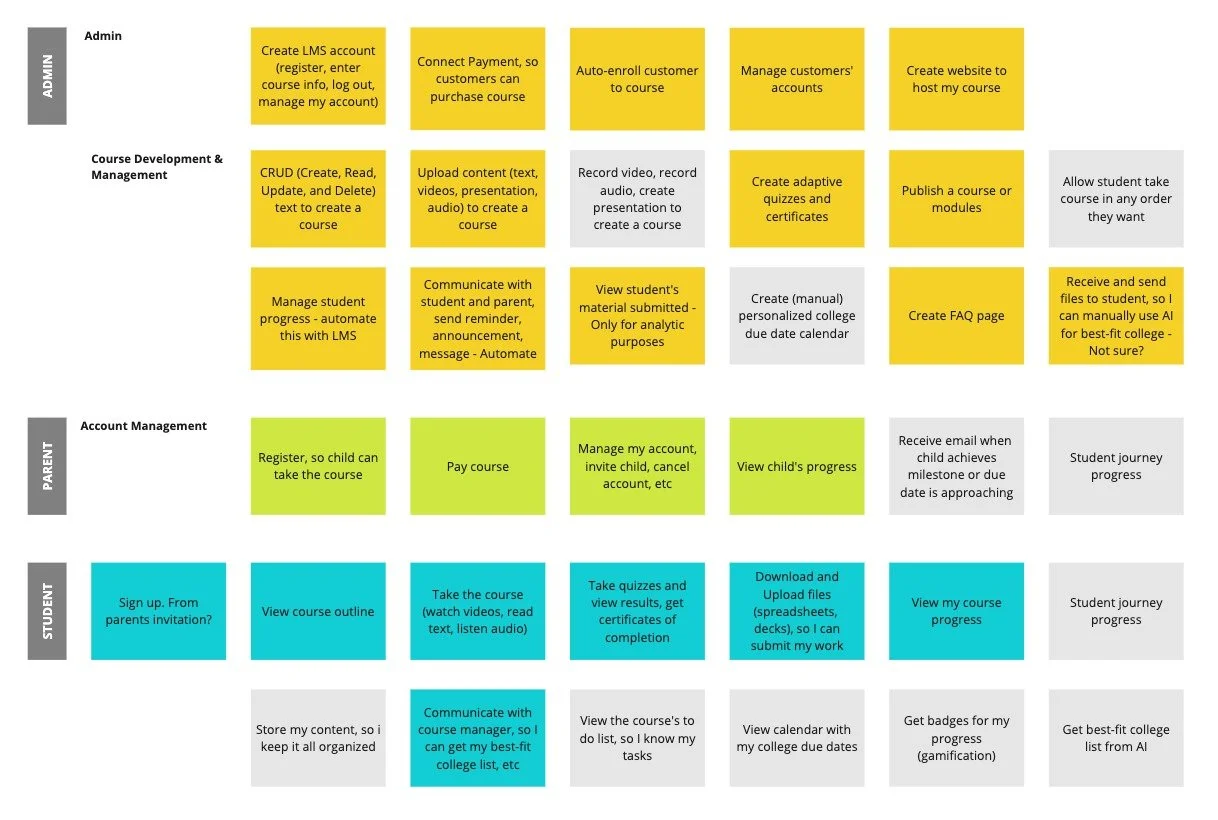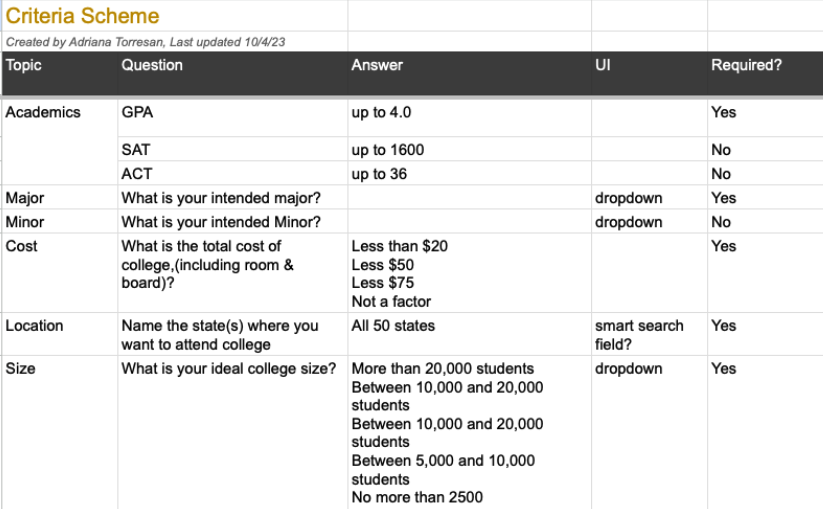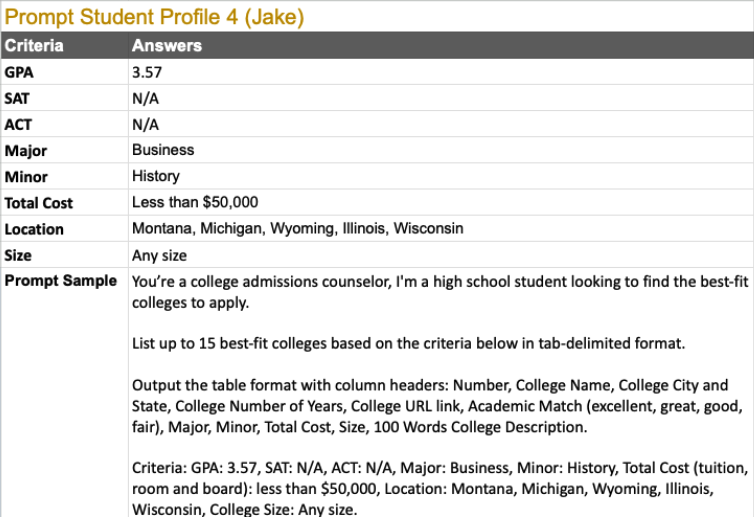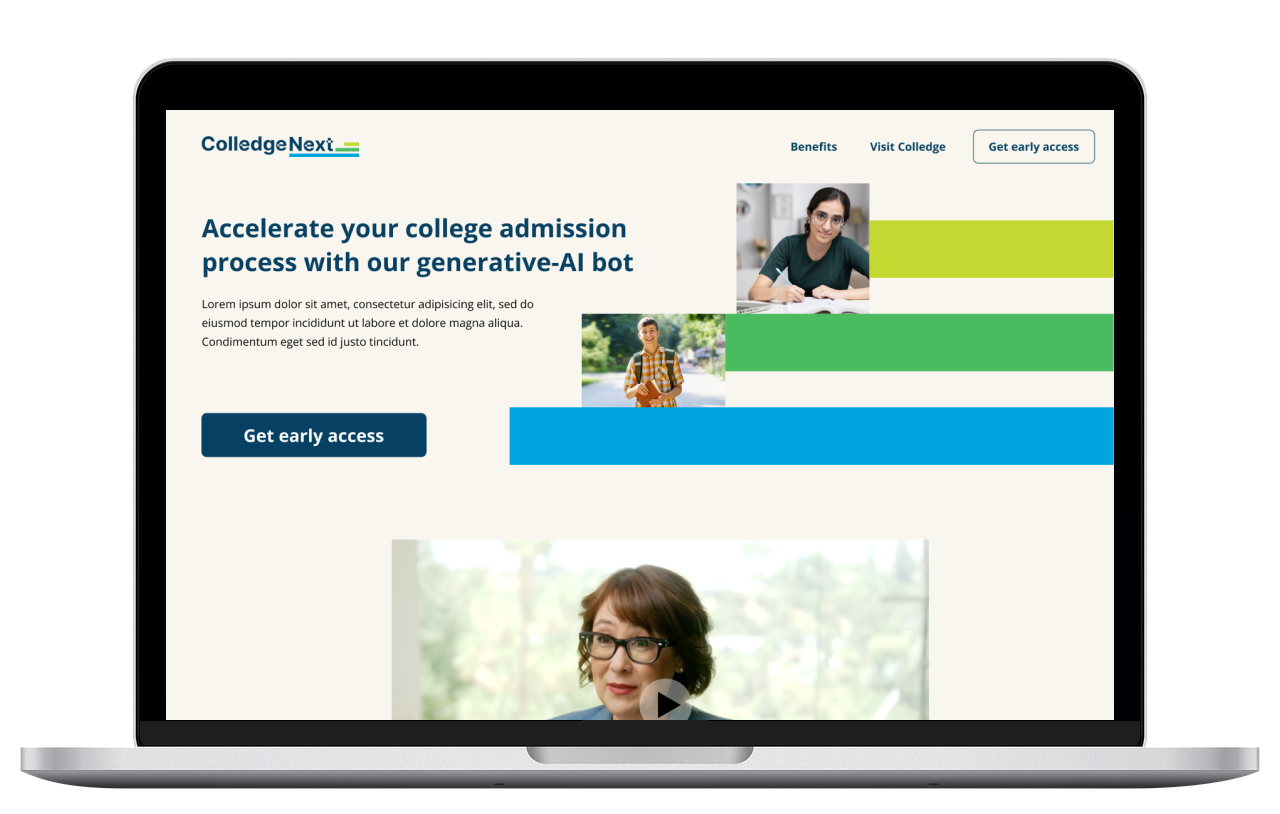Democratizing College Counseling
with Generative AI
ColledgeNEXT is an early-stage EdTech startup building a conversational AI tool to help first-generation and underrepresented students navigate the complex college admissions process. The goal was to democratize access to expert guidance typically reserved for affluent students and families.
Role
Product Design and Management Consultant
Timeframe
6 months, 2023
ChatGPT Prompt Experiment
Tasks
UX Research & Design, Product Strategy
Industry
EdTech
Product Category
Consumer product
Challenges
Bridging the College Guidance Gap – A 400:1 student-to-counselor ratio and increasing admissions complexity leave students without the support needed to find and apply to college.
Translating Vision into a GenAI MVP – Turning a powerful mission into a focused, testable MVP required careful scoping, while also navigating technical unknowns around generative AI and selecting development partners.
Designing for Trust & Support – The experience needed to feel credible, encouraging, and human—for students navigating high-stakes decisions.
Objectives
Test CollegeNEXT Beta and Business Model – Launch a ChatGPT-powered college counseling MVP with free and paid tiers to validate product-market fit, including user interest, perceived value, engagement, and willingness to pay.
The hypothesis: Students will get into more schools if they have access to lower-cost, high-quality college counseling.
Explore Generative AI Integration – Evaluate ChatGPT’s effectiveness in generating accurate, relevant, and supportive college recommendations.
Create a Supportive Student Experience – Design a UX that feels encouraging, easy to use, and trustworthy for students making high-stakes decisions.
User Profile
Outcomes
Identifying a user profile early on was a critical step that laid the groundwork for everything that followed—research, design, development, marketing, and even sales. At this stage, we created a user profile hypothesis based on patterns we observed from previous Colledge clients.
In-depth Interviews
Design Process
Summary
We interviewed 6 first-year college students and 6 parents to validate hypotheses around course content, target audience, AI value, and willingness to pay.
Key Learnings
Best-fit college lists and essay writing were top challenges.
Time management was a surprising pain point.
Essay struggles often stemmed from lack of self-reflection.
Users had high expectations for AI.
Recommendations
Focus the MVP on creating a best-fit college list.
Explore future features like essay support, time management, and self-discovery tools.
Feature Requirements
Proof of concept User Flows
The original goal was to build a Learning Management System (LMS) powered by Generative AI—a course to guide students and parents through the entire college admissions process.
However, the scope proved too ambitious for an MVP. We pivoted and narrowed the focus to a more achievable first step: helping students generate a personalized college list.
GenAI Design Considerations
We tested ChatGPT with past Colledge clients to validate its accuracy. Early prompt engineering experiments showed over 85% accuracy, confirming it as a strong fit for our platform.
Product Roadmap
Proof of concept wires
Trust & Transparency – Explain how ChatGPT generates results and its limitations.
Guardrails & Guidance – Use multiple-choice questions and prompts to guide users; include options like “Refine List.”
Personalization – Let students prioritize what matters to them (e.g., size, affordability) and update preferences easily.
Human Handoff – Recommend when to seek real counselors or external resources.
Ethics & Bias Mitigation – Test for fairness and design inclusively, especially for underrepresented users.
Experimentation & Validation – Use research to fine-tune prompts, tone, and conversational flow.
The Best-fit college list POC was designed as a simple multiple-choice questionnaire with filtering and “Refine List” options to guide students through their college search. Built around defined business rules, the interface focused on clarity, ease of use, and progressive disclosure.
Waitlist Site
A waitlist website was created to drive acquisition and validate early interest, while capturing key data points to refine messaging, pricing, and user segments.
Lessons learned
Validated MVP Scope
User interviews and prompt testing revealed that the college list builder was the highest-need and most feasible starting point, helping narrow the product vision and reduce scope.
Established AI Feasibility
Prompt experimentation with ChatGPT confirmed it could deliver credible and personalized results, validating its role in the MVP.
Accelerated Go-to-Market Readiness
Deliverables like wireframes, user flows, and a live waitlist site positioned the founder to quickly engage users and prepare for a Beta launch.
Start Narrow to Go Far
Ambitious visions need to be distilled into focused, testable MVPs. Starting with the most urgent user pain—building a college list—created early traction and clarity.
AI Needs Guardrails
Even powerful tools like ChatGPT require thoughtful design—students expected an experience that was both sophisticated and transparent.
User Research is a Compass
Generative interviews revealed unexpected insights (like time management struggles), helping avoid assumptions and shape a product that truly resonates.















